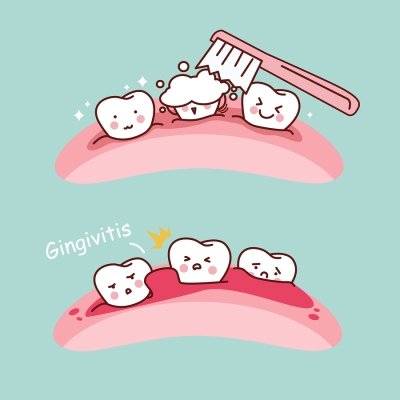If you’re wondering if you have gingivitis or what it can do to your oral health, then our dental care blog can help educate you on what it is and the treatment for it.
WHAT IS IT?
People with gingivitis have inflamed gum tissue around their teeth, caused by bacteria found in dental plaque. Normal, healthy gums should be firmly attached to the teeth and underlying bone. They are pale pink in light-skinned people and brown, gray or mottled in people with darker complexions. If you have gingivitis, your gums are inflamed, red and swollen. They will bleed easily and may be tender. Mild gingivitis causes little pain and may be overlooked. If left unchecked, however, it can become severe. In some people, gingivitis progresses to periodontitis, which can lead to tooth loss.
Gingivitis is caused by plaque, a sticky film of bacteria that collects on your teeth, especially in crevices and spaces or around rough or broken fillings. The bacteria produce substances that can harm the gums. If plaque is not removed, it hardens into a deposit called calculus, commonly called tartar. Calculus irritates the gums and provides more surfaces for bacterial growth.
Gum disease in general and gingivitis, in particular, are common. Almost three in four adults over the age of 35 have some form of gum disease. People with poorly controlled diabetes and pregnant women are especially at risk. People taking oral contraceptives or systemic steroids are at increased risk of gingivitis. Certain prescription drugs — including anti-seizure medications, cyclosporin (Neoral, Sandimmune) and calcium channel blockers — can cause gum overgrowth and inflammation.
SYMPTOMS
You will notice red, swollen, gums that bleed easily.
DIAGNOSIS
Your dentist will examine and probe your gums and ask you if they bleed when you brush or floss your teeth. He or she will look for calculus deposits on your teeth and under the gum line.
Make sure your dentist knows the medications you are taking, in case some of them may be contributing to your gingivitis.
EXPECTED DURATION
Gingivitis can disappear within several days once a program of good oral hygiene is started. If oral hygiene remains poor, gingivitis likely will remain and could worsen to become periodontitis, which can lead to significant loss of tissue and bone around teeth.
PREVENTION
Brush your teeth regularly, preferably in the morning and before bed, and floss your teeth at least once a day. Make sure that you use a soft toothbrush and that the bristles reach the gum line when you brush. Have your teeth professionally cleaned every six months to one year to prevent plaque from becoming calculus and to remove any calculus that may have already formed.
TREATMENT
Gingivitis can be reversed if you remove bacteria from your teeth every day. At our dental office, you will receive a thorough cleaning, which will include scaling (removal of plaque at and just below the gum line). The dentist or dental hygienist can instruct you on the most effective methods of brushing and flossing. Controlling medical conditions, such as diabetes, can make gingivitis easier to treat.
If gingivitis advances to periodontitis, additional treatment is necessary.
PROGNOSIS
The outlook is excellent, once you start a program of good dental hygiene. Symptoms can disappear in as little as one week.
WHEN TO CALL A PROFESSIONAL
If your gums become tender or bleed easily when you brush your teeth, contact your dentist. To practice good dental care contacts us, or call 519-305-9100 to schedule your appointment today!
SOURCE: HTTPS://WWW.COLGATEPROFESSIONAL.COM/PATIENT-EDUCATION/ARTICLES/GINGIVITIS

